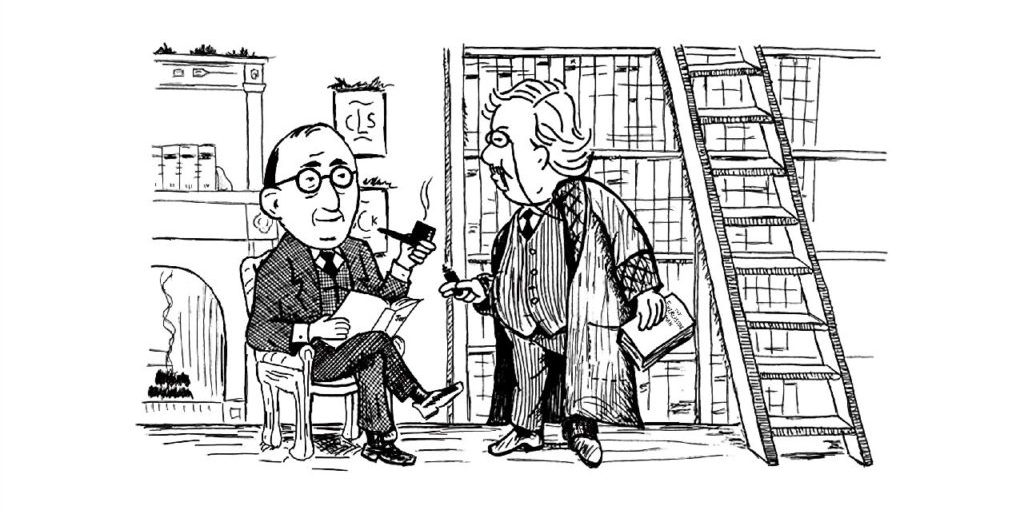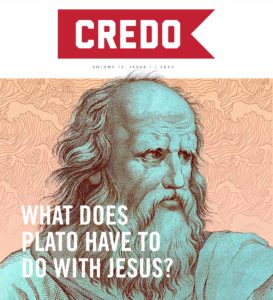
10 Questions with Dan DeWitt: A Conversation on Philosophy, Apologetics, and the Arts
The latest issue of C redo Magazine focuses on Christian Platonism. The following is one of the issue’s featured interviews with Dan DeWitt. Dr. DeWitt is the Director of the Center for Biblical Apologetics and Public Christianity and Associate Professor of Applied Theology and Apologetics at Cedarville University.
redo Magazine focuses on Christian Platonism. The following is one of the issue’s featured interviews with Dan DeWitt. Dr. DeWitt is the Director of the Center for Biblical Apologetics and Public Christianity and Associate Professor of Applied Theology and Apologetics at Cedarville University.
1. You’ve written a thing or two about Christian apologetics. How did you first become interested in apologetics?
My introduction to apologetics was one of necessity. As a junior in Bible College, I was facing questions and concerns of my own. Several friends from childhood had walked away from the faith and I wasn’t sure how to best respond. Not only was I unsure of the best answers, I had lingering doubts about whether or not there were good answers to be found.
I took a course in apologetics as an opportunity to spend more time thinking about why I believed what I did. My professor was a gentle person with a pastoral approach to doubt and doubters. I loved the class. It all started there. Over the years I’ve continued a steady diet of authors who model how to make a winsome case for the Christian faith.
2. The theme of this issue is Christian Platonism, which is one of the pillars necessary for a classical understanding of Christian Theology. How do you teach metaphysics to your students and what value does philosophy serve in the realm of apologetics?
I used to teach an introduction to philosophy course at Boyce College. I would always take my students to a local cemetery for the first lecture. This was quite an ordeal as the class was usually over seventy students.
I would ask the students why philosophy mattered. After listening to their responses, I would suggest that philosophy matters because it is humanity’s best attempt to answer questions that have expiration dates. Every person has a limited amount of time to figure out what matters most, what’s really real, and how to pursue a good life. I would point to the headstones around us and say, “That’s her expiration date.” Pointing to another, “That’s his expiration date.”
Philosophy is the discipline of taking these questions seriously. I like to tell my students that their view of metaphysics frames all that follows, from epistemology to axiology. Understanding these categories and how they relate one to another is crucial for talking about the Christian faith in the marketplace of ideas. An atheist is more likely to be converted by an ambush of the heart than an argument of the head. Click To Tweet
3. You served in a variety of academic and pastoral roles prior to starting the Center for Biblical Apologetics and Public Christianity at Cedarville in 2016. How did those earlier seasons prepare you?
The most transformative experience for me was starting and leading a campus for my church in Louisville, Kentucky. My pastor asked me to help launch a new campus that would target the community on and around the University of Louisville. We met on the university campus in a building called the Red Barn. Those who were far from the Christian faith would regularly attend. Instead of any sort of invitation, we closed every teaching time with Q&A.
This experience helped me understand both the potential and limits of apologetics. It also was a crash course in realizing I’m not an expert on every topic and shouldn’t pretend to be. Nonetheless, my confidence in the Christian worldview to account for reality only deepened. I think if it weren’t for that experience, I would be much more tempted to offer cookie cutter answers to complex questions, or to look at contemporary topics in a way that is isolated from concern for real people.
4. You are an avid sketch artist, drawing literary giants and their beloved worlds and characters. How did you get into drawing and how has your faith inspired your art over time?
My junior year of high school a small women’s organization in my hometown awarded me a scholarship to attend a summer art program at Eastern Illinois University. I loved every minute of it. But when I left for Bible college a year later, I felt the creative chapter of my life was closing. It took me a long time to feel comfortable talking about my artistic ambitions again. It was G.K. Chesterton who liberated me to put down a textbook and pick up my sketch pad. There’s a time for both. There is glory in both. Though I consider myself a mere amateur artist, I find great joy in sketching.
5. While we’re talking about Christianity and the arts, why is it worthwhile for the Christian to pursue the arts, even if that’s not his or her area of expertise?
Francis Schaeffer once said that it is the Christian whose “imagination should soar beyond the stars.” I can’t help but think of Dorothy Sayers’ poem “The Makers,” which reminds us that our creativity is a reflection of our Creator. Art can show both how the world is and also how it should be. As Christians, we have a deep well to draw from for both. In so doing, Christians are able to point people to the very nature of reality itself, and to the end of all things, and illustrate the power of the gospel to speak to our deepest longings.
Peter Hitchens, brother of famed atheist Christopher Hitchens, makes a simular point in his book The Rage Against God: How Atheism Led Me to Faith. To paraphrase Christopher, an atheist is more likely to be converted by an ambush of the heart than an argument of the head. C.S. Lewis used imaginative writing to steal past ready made rational defenses to the faith, what he described as “watchful dragons.”

